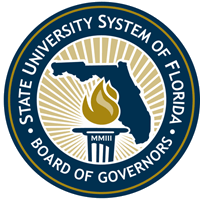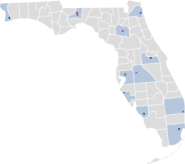Florida Board of Governors
The Florida Board of Governors is a 17-member governing board that serves as the governing body for the State University System of Florida, which includes all public universities in the state of Florida.
 | |
| Type | Governing Board |
|---|---|
| Established | 2003 |
| Chancellor | Marshall Criser III |
| Students | 341,000 (2018) |
| Location | , , U.S. |
| Campus | 12 |
| Website | www |
After its predecessor, the Florida Board of Regents, was abolished by an act of the Florida Legislature that was signed into law by Governor Jeb Bush in July 2001, United States senator Bob Graham, who objected to the abolition of the statewide higher education body (Board of Regents), responded by leading a ballot initiative to restore it. The Board of Governors was established in 2003 after the successful passage of the constitutional amendment heralded by Graham in 2002. A statewide board of education, also appointed by the governor, oversaw kindergarten through higher education, but focused mostly on K-12 education and community colleges. The Board of Governors, as part of the Florida Constitution, cannot be abolished without another constitutional amendment.
During the 2017-2018 academic year, the State University System enrolled roughly 341,000 total students.[1]
Board composition
The Florida Board of Governors has seventeen members, including fourteen voting members appointed by the governor, as well as, the Florida commissioner of education, the chair of the Advisory Council of Faculty Senates, and the president of the Florida Student Association. The board appoints a chancellor, who serves as the system's chief executive.
| Governors[2] | ||
|---|---|---|
| Name | Profession | Term |
| Appointed by Governor | ||
| Tim Cerio | attorney | 10/27/2017 - 1/6/2024 |
| Aubrey Edge | President & CEO, First Coast Energy | 2/3/2020 - 1/6/2027 |
| Patricia Frost | retired school principal | 10/27/2017 - 1/6/2024 |
| H. Wayne Huizenga, Jr. | businessman | 1/10/2013 - 1/6/2020 |
| Darlene L. Jordan | former attorney | 6/22/2017 - 1/6/2024 |
| Sydney Kitson, Chair | real estate developer | 6/22/2017 - 1/6/2024 |
| Charles H. Lydecker | insurance executive | 6/14/2019 - 1/6/2020 |
| Brian Lamb, Vice-Chair | business executive | 3/29/2019 - 1/6/2026 |
| Alan M. Levine | President & CEO, Mountain States Health Alliance | 6/22/2017 - 1/6/2024 |
| Steven M. Scott | physician and entrepreneur | 3/29/2019 - 1/6/2026 |
| Eric Silagy | President & CEO, Florida Power & Light | 3/29/2019 - 1/6/2026 |
| Kent Stermon | COO, Total Military Management | 3/29/2019 - 1/6/2026 |
| Norman D. Tripp | attorney | 3/8/2013 - 1/6/2020 |
| Remaining Members | ||
| Richard Corcoran | Commissioner of Education | 6/17/2019 - |
| Shawn D. Felton | Chair, Advisory Council of Faculty Senates | 8/4/2018 - 8/3/2020 |
| Zenani D. Johnson | Chair, Florida Student Association | 6/1/2019 - 5/31/2020 |
University campuses
| Universities | ||
|---|---|---|
| University | Location | Established |
| Florida A&M University | Tallahassee, Florida | 1887 |
| Florida Atlantic University | Boca Raton, Florida | 1961 |
| Florida Gulf Coast University | Fort Myers, Florida | 1991 |
| Florida International University | Miami, Florida | 1965 |
| Florida Polytechnic University | Lakeland, Florida | 2012 |
| Florida State University | Tallahassee, Florida | 1851 |
| New College of Florida | Sarasota, Florida | 1960 |
| University of Central Florida | Orlando, Florida | 1963 |
| University of Florida | Gainesville, Florida | 1853 |
| University of North Florida | Jacksonville, Florida | 1969 |
| University of South Florida | Tampa, Florida | 1956 |
| University of West Florida | Pensacola, Florida | 1963 |
Think Florida
In January 2016, the State University System launched a statewide communications and marketing campaign to build and bolster the state's entrepreneurial climate - Think Florida: A Higher Degree for Business. The campaign's focus is a strong connection between the system's universities and Florida's businesses, with an emphasis on collaboration in the areas of talent, research and partnerships.[3][4]
Performance-based funding
The Board of Governors unveiled a performance-based funding model in 2014 to incentivize universities to improve on key metrics, from graduation rates to post-graduation success.
The model has four guiding principles:
- use metrics that align with SUS Strategic Plan goals,
- reward excellence or improvement,
- have a few clear, simple metrics, and
- acknowledge the unique mission of the different institutions.
Key components of the model:
- Institutions will be evaluated on either excellence or Improvement for each metric.
- Data is based on one-year data.
- The benchmarks for excellence were based on the Board of Governors 2025 System Strategic Plan goals and analysis of relevant data trends, whereas the benchmarks for Improvement were determined after reviewing data trends for each metric.
- The Florida Legislature and governor determine the amount of new state funding and a proportional amount of institutional funding that would come from each university's recurring state base appropriation.[5]
See also
References
- "System Accountability Report Summary".
- "State University System of Florida | Board of Governors". Flbog.edu. Retrieved 2020-03-09.
- "State University System of Florida | Board of Governors : Press Room". flbog.edu. Retrieved 2016-03-10.
- "Think Florida – The State University System of Florida leverages its distinctive strengths for the benefit of all the state's citizens and business enterprises". www.think-florida.org. Retrieved 2016-03-10.
- "Board of Governors Performance Model Overview" (PDF). Florida Board of Governors. Archived from the original (PDF) on 5 September 2015. Retrieved 10 March 2016.

External links
| Preceded by Florida Board of Regents |
Governing Body for the State University System of Florida 2003–Present |
Succeeded by NA |
